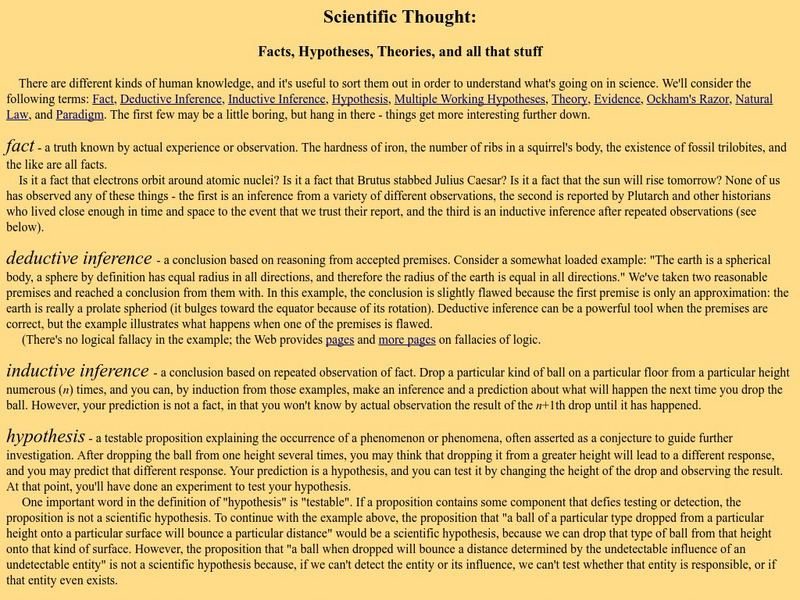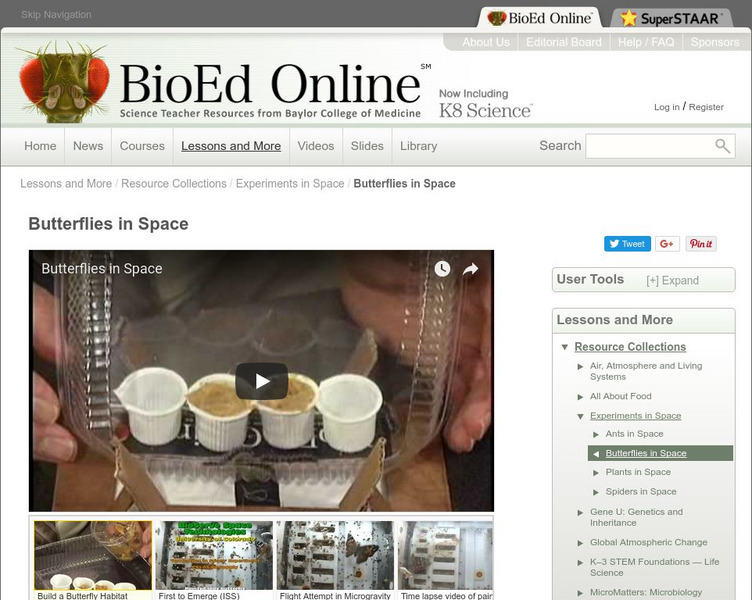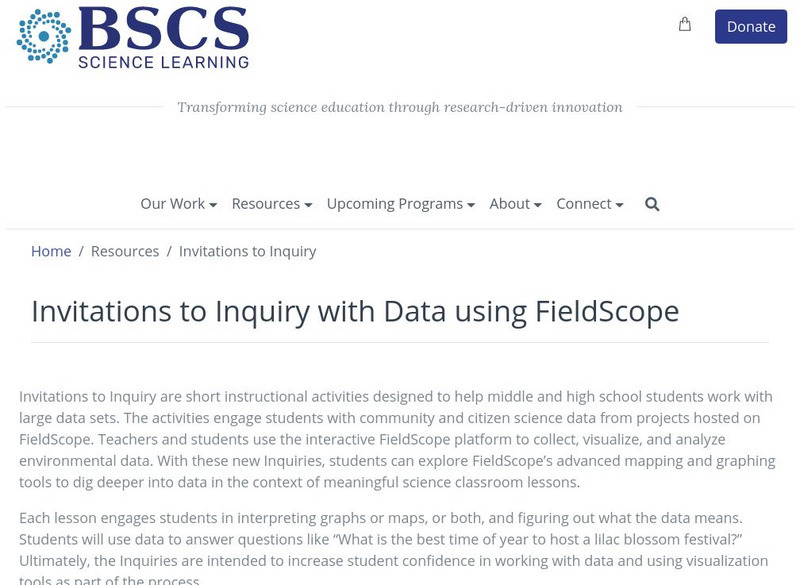Children's Museum
The Children's Museum of Indianapolis: Curious Scientific Investigators: Flight Adventures
Students will make paper rockets, parachutes, and foam gliders to experience how objects move through the air. Explore topics such as thrust, weight, gravity, force, and lift through fun activities and stories and cutting-edge work done...
TED Talks
Ted: Ted Ed: Not All Scientific Studies Are Created Equal
Use this TED Ed lesson, to learn why you should be skeptical of scientific research. Lesson is complete with video, questions, and links to resources for deeper understanding of the topic.
Oak Ridge National Laboratory
Oak Ridge National Laboratory: Field Investigation Source Platform
This site from the Oak Ridge National Laboratory gives a description of field investigation and then provides a detailed break-out of each step in the process.
Vision Learning
Visionlearning: Culture of Science: Scientists and the Scientific Community
A look at the human side of science. Take a look at how background and motivation can lead to different perspectives, discoveries, and progress in science.
University of Georgia
University of Georgia: Scientific Thought: Facts, Hypotheses, Theories, Etc.
Provides explanations of terms used in science: fact, deductive inference, inductive inference, hypothesis, multiple working hypotheses, theory, evidence, Ockham's Razor, natural law, and paradigm.
BSCS Science Learning
Bscs: Asking and Answering Questions With Data
This inquiry is intended to provide students with practice developing investigable questions that need data, and specifically large datasets, to be answered. Click the teacher resources link for teaching guides and student handouts.
Other
Bscs: Asking and Answering Questions With Data
In this self-directed lesson, learners use graphs and maps of water quality to investigate relationships between variables to answer questions. A handout with everything the student needs to complete this lesson is available as a PDF or...
BioEd Online
Bio Ed Online: Butterflies in Space
In 2009, four painted lady butterflies flew aboard space shuttle Atlantis to the International Space Station, where they grew and lived. Students can use original photos from the mission to conduct open-ended scientific investigations to...
NASA
Nasa: Discovery Mission: Messenger
The MESSENGER (MErcury: Surface, Space ENvironment, GEochemistry and Ranging) mission is a scientific investigation of the planet Mercury. This site provides information about its mission objectives and management.
Huntington Library
Huntington Library: Seeds, Soil, and Surprises
This site has excellent resources for teaching students about plants. It has a guide to scientific investigation and a glossary of plant terms. There are three lessons that each include a slideshow on the parts of a plant, the needs of...
Open Ed
Open Ed Sci: 7.5 Ecosystem Dynamics
This unit on ecosystem dynamics and biodiversity begins with students reading headlines that claim that the future of orangutans is in peril and that the purchasing of chocolate may be the cause. Students launch a scientific...
Smithsonian Institution
Smithsonian Education: Minerals, Crystals, and Gems
Through this series of three lessons, students will gain an understanding of the basics of mineral science. In their investigation they will also work through the scientific process as they practice their observation skills, form...
Vision Learning
Visionlearning: The Process of Science
An introduction to scientific process and thinking like a scientist.
Other
Lunar and Planetary Institute: The Surveyor Program
A good site about the Surveyor missions to the moon, which includes findings from the experiments that were aboard the lander.
BSCS Science Learning
Bscs: Globe at Night Dark Skies
In this inquiry, students predict the best place to stargaze in Arizona based on the brightness of the night sky. Students are introduced to the concept of light pollution and Globe at Night, a global citizen science project in which...
BSCS Science Learning
Bscs: Frog Symphony
This inquiry focuses on analyzing spatial and temporal data for frog calls to determine the best time of day and location to hear a symphony of frogs. Click on the link for teaching guides and handouts.
BSCS Science Learning
Bscs: Budburst Lilac Festival
In this Inquiry, students predict the best date to host a lilac blossom festival so that lilacs are in full bloom in the city where students live. Students are introduced to Project Budburst, a citizen science project in which volunteers...
BSCS Science Learning
Bscs: Globe at Night Dark Skies
In this inquiry, students predict the best place to stargaze in Arizona based on the brightness of the night sky. Students are introduced to the concept of light pollution and Globe at Night, a global citizen science project in which...
BSCS Science Learning
Bscs: Stocking Rivers With Trout
This inquiry looks at fish farming and the management of trout by state environmental resource specialists in Colorado. Students will practice working with data generated from a statewide citizen science project called River Watch of...
Other
Bscs: Stocking Rivers With Trout
For this self-directed lesson, students use data from a Colorado citizen science program to make recommendations on the best waterways for stocking trout. A handout with everything the student needs to complete this lesson is available...
Other
Bscs: Budburst Lilac Festival
In this self-directed activity, students use graphs and maps of lilac phenology data to determine the best time to host a lilac blossom festival in their area. A handout with everything the student needs to complete this lesson is...
Climate Literacy
Clean: Climate Change on the Antarctic Peninsula
In this cross-curriculum inquiry, students use a cooperative approach to investigate the effect of climate change on the ecosystem of the Antarctic Peninsula. The activity stresses the importance of evidence in the formulation of...
BSCS Science Learning
Bscs: Invitations to Inquiry With Data Using Field Scope
Invitations to Inquiry are short instructional activities designed to help middle and high school students work with large data sets. Teachers and students use the interactive FieldScope platform to collect, visualize, and analyze...
Sophia Learning
Sophia: Psychological Research Ethics
This lesson will identify and describe the basic ethical guidelines for researchers as set forth by the American Psychological Association Code of Ethics.











